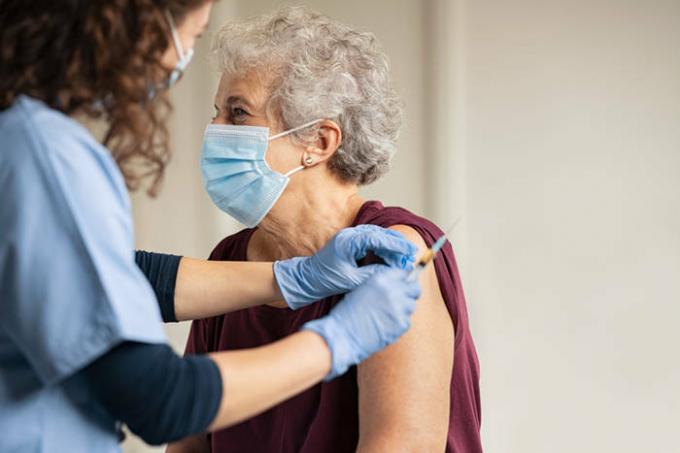The flu season is just around the corner, and a vaccination campaign has already begun in the country. Why, who, and when should get the flu shot? The doctor answers these and other questions.
No matter how the situation with the coronavirus changes, no one canceled other diseases. Our country is again on the verge of the traditional season of respiratory infections. The Ministry of Health has already named 3 strains of influenza, who will most actively attack the Ukrainians this year. And last week, many clinics announced the start of vaccination against this disease. Who should get the flu shot this season? What are the criteria for choosing a vaccine and when should it be injected? Can the flu shot and the coronavirus be combined? Maria Krepak, a pediatrician of the Kinderklinik network of children's clinics, spoke about this.
What is the danger of influenza and what complications can there be?

Fever and headache can knock you out for a week
Influenza is a contagious infectious disease that each of us has had at least several times in our lives. It cannot always be distinguished from other respiratory infections. However, it is more characterized by a high temperature than other diseases: usually with flu, fever reaches levels up to 39 degrees. In addition, the flu is accompanied by poor health: muscle pain and body aches, headache, general weakness. A child with the flu is usually very lethargic, and the temperature does not go down well
You may not have other flu symptoms. However, some people may experience coughing, redness of the eyes, and sometimes skin rashes. These are signs of a not very good course of the flu: as a rule, they indicate the beginning of complications.
Complications of influenza can be very different. It:
viral pneumonia,
inflammation of the heart muscle (myocarditis),
inflammation of the brain (meningitis and encephalitis).
They do not always develop and not in everyone, but it is almost impossible to predict in advance what the course of the flu will be.
“Complications of influenza can be associated with the virus itself,” explains Maria Krepak. - It can only affect the respiratory tract, but it can affect the nervous system. Also, complications can be associated with the addition of a bacterial infection: against the background of the fact that the body is weakened, bacteria are activated, which are normally suppressed by the immune system. The third option for the development of complications is an exacerbation of chronic diseases. The more health problems a person has, the more dangerous the flu is for him. "
Why you need to get vaccinated against the flu every year

The flu mutates and creates new strains every year / istockphoto.com
The peculiarity of the flu is that it constantly mutates. There is no stable strain that circulates from year to year. “Firstly, there are two types of influenza, type A and type B,” says Maria Krepak. - Influenza A is quite dangerous, it is difficult and often gives complications. Influenza B is easier to carry, but it also creates a high incidence. These viruses have new strains every year that can potentially provoke a more severe course of the disease. "
According to the emergence of new strains, the vaccine is updated every year. Usually, for its creation, several strains of influenza are taken, which were widespread in the last season, and one of the strains that has just appeared and can give a surge in the incidence. Manufacturers do not choose strains on their own: there are clear WHO recommendations for this.
“That is why they are vaccinated against influenza every year, because the immunity that a person acquired with the vaccine last year may not protect him from a new strain of the disease,”- emphasizes Maria Krepak.
How old is the flu shot?

Influenza is considered especially dangerous for children under 3 years old.
According to Maria Krepak, flu vaccination is allowed for babies from 6 months old. Moreover, the WHO believes that children under 3 years of age are in a special risk group, so they must be vaccinated. The fact is that at this age, the child, most likely, has never met the flu virus. Therefore, he does not even have basic immunity against this disease, not to mention the specific protection that is directed against specific strains.
For children under 9 years of age, the first flu shot should be given in two stages: first one, and after 28 days a second dose. If the child has already been vaccinated, one vaccination is enough for him every next year. Children over 9 years old and adults are given one dose of the drug, regardless of whether the person has been vaccinated against influenza before or not.
Who needs a flu shot first?

Pensioners are at the main risk group
In addition to children up to those years, the risk group includes those who have chronic diseases. The more of these diseases, the more a person needs vaccination. Also, according to WHO recommendations, people over 60 years of age must be vaccinated against influenza.
“Firstly, there are definitely chronic diseases at this age. Secondly, the peculiarities of the immune defense are such that the older the person, the worse the immune system works, so the risk of complications is high, ”- says Maria Krepak.
The fourth risk group is pregnant women and breastfeeding mothers. In addition, it is highly desirable to be vaccinated for all people who have a baby in their family. This way you minimize the risks of bringing infection into your home.
Which flu vaccine is best for you?

All modern flu vaccines are equal
Today in Ukraine there are three flu vaccines freely available. It:
- Jis Flew,
- Influvac,
- "Vaxigrip".
You can buy them at a pharmacy (from 250 to 400 UAH) and come with the drug for an injection to a public hospital, or order at a private clinic and get vaccinated on the spot. Is there any fundamental difference in these vaccines? Maria Krepak says no.
“All these vaccines are currently completely equivalent. They are all four-component, they have the same composition and the same strains are inside. Therefore, it is inappropriate to choose between them: if you decide to be vaccinated, you can inject what is available, ”- says the expert.
When to get the flu shot

The flu shot should be done in September-October.
The gold standard for influenza vaccination is September and early October. “It takes 10-14 days for the vaccine to start working. You have been vaccinated, and immunity will come in two weeks. Therefore, if you do it now, by mid-October you will be fully prepared to face the virus. The further you put it off, the later the immunity will start to form, ”emphasizes Maria Krepak.
Should you postpone the flu vaccine if you recently got the coronavirus vaccine? Only until your health after vaccination improves, says Maria Krepak. “These vaccines have nothing to do with each other. Since both of them are not alive, they can be done at any time interval. As soon as you feel healthy enough after one vaccination, you can immediately do another, ”the doctor sums up.
You will also be interested to read:
How to tell a cold from the flu: a cheat sheet for parents
Child Health: Everything You Wanted to Know About H1N1 Flu

